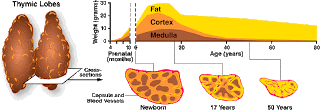THYMUS
The Thymus is the site of T-cell and maturation.It is a flat,bilobed organ situated above the heart.Each lobe is surrounded by a capsule and is divided into lobules,which are separated from each other by strands of connective tissue called trabaculae.Each lobule is organized into two compartment,or cortex,is densely packed with immature T cells,called thymocytes,whereas the inner compartment,or medulla,is sparsely populated with thymocytes. |
| Diagrammatic cross section of portion of thymus. |
The function of the thymus is to generate and select a repertoire of T cells that will protect the body from infection.As thymocytes develop,an enormous diversity of T cell recptors is generated by a random process that produce some T cells with receptors capable of recognizing antigen-MHC complexes.However,most of the T-cell-receptors produced by this random process are incapable recognizing antigen-MHC complexes and a small portion react with combinations of self antigen-MHC complexes.The thymus induces the death ot those that react with self-antigen-MHC and pose a danger of causing autoimmune disease.
THE THYMUS AND IMMUNE FUNCTION:
 |
| Changes in Thymus with age. |

0 comments